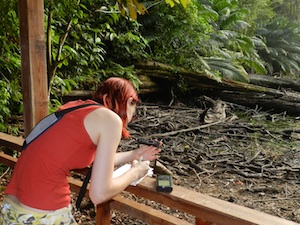
Why did you decide to volunteer with Frontier in Costa Rica?
Vicky: I wanted to try something new, have an adventure and gain more experience in my field. I read details of projects that involved big cats, and as I had been to Africa the year before, I decided Central America would be an amazing place to visit. I was also half way through my MSc when I booked the trip and wanted something exciting to celebrate after graduating and something to look forward to.
The final decision maker was the opportunity to carry out my own research project through a BTEC Certificate in Tropical Habitat Conservation. I am keen to get into research and this was an excellent way to plan and carry out work in the field.
Describe your day to day activities as a volunteer.
Vicky: While in Costa Rica, our daily routine started around 06:00 with breakfast – usually porridge or granola and, on some occasions, pancakes. We would then head out on a survey, either primates or birds and collect data. We were usually arrived back at camp for 08:30 where people would carry out their own work or activities. I spent time writing my blog and doing BTEC work.
Lunch was around 12:00 and we took it in turns each day to be in charge of cooking for the group and carry out camp duties – involving keeping main deck clean, preparing meals and ensuring the camp is clean and tidy. Mid-afternoon was spent relaxing and carrying out work to avoid the midday sun. Late afternoon/evening involved carrying out the final survey of the day before supper at 18:30. Some evenings involved games nights or heading to the local bar. On busier days we were usually in bed by 20:00-21:00, in preparation for the next day.
What made this experience unique and special?
Vicky: The camp is in a protected area on privet land meaning that not many people have seen the area. I feel privileged to have been involved with such a project.
How has this experience impacted your future?
Vicky: Yes, most definitely. Not only was this experience an enthusiasm and confidence boost, I also gained practical field research skills. As a keen conservation researcher, who is in the process of preparing for my PhD this year – it definitely gave me the boost I needed.